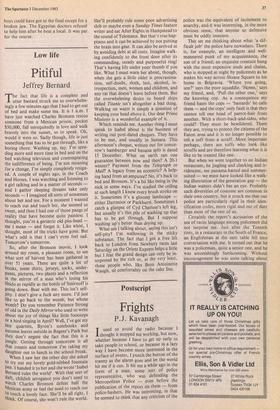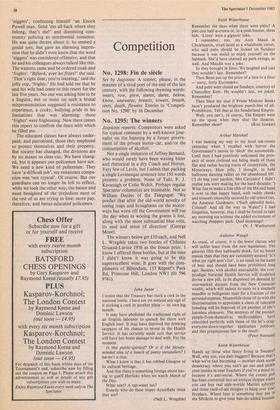Postscript
Frights
P.J. Kavanagh
Iused to avoid the radio because I thought it stopped me working, but now, whether because I have to get up early to take people to school, or because in a lazy way 1 have become more interested in the surface of events, I punch the button of the tranny as the alarm goes and let the world hit me if it can. It hit me a while ago in the form of a man, some sort of police representative, who was defending the Metropolitan Police — even before the publication of the report on them — from police-bashers. He was interesting, in that he seemed to think that any criticism of the police was the equivalent of incitement to anarchy, and it was interesting, in the more obvious sense, that anyone so defensive must be oddly insecure. This set me thinking about what 'a dif- ficult job' the police have nowadays. There is, for example, an intelligent and well- mannered punk of my acquaintance, the son of a friend; an exquisite creature hung with the most expensive studs and chains, who is stopped at night by policemen as he makes his way across Sloane Square to his home in Belgravia. 'Where you going, son?' says the poor squaddie. 'Home,' says my friend, and, 'Pull the other one,' says the knowing cop. As a consequence my friend hates the cops — 'bastards' he calls them — and the cops' only fault is that they cannot tell one head of parrot-hair from another. With a short-back-and-sides, who could? They must be bewildered. There they are, trying to protect the citizens of the Eaton area and it is no longer possible to tell a toff from a scruff. More important perhaps, there are toffs who look like scruffs and are therefore learning what it is like to be treated like one. But when we went together to an Indian restaurant, he jingling and clanking and ir- ridescent, me panama-hatted and summer- suited — we must have looked like a walk- ing illustration of the generation gap — the Indian waiters didn't bat an eye. Probably such diversities of costume are common in their own country, but it struck me that our police are particularly rigid in their iden- tification codes, more rigid and out of date than most of the rest of us. Certainly the report's accusation of the use of racist language among policemen did not surprise me. Just after the Toxteth riots, in a restaurant in the South of France, an Englishman at the next table fell into conversation with me. It turned out that he was a policeman, quite a senior one, and he was astonishingly forthcoming. Without encouragement he was soon talking about `niggers', confessing himself 'an Enoch Powell man. Send 'em all back where they belong, that's me!' and dismissing com- munity policing as sentimental nonsense. He was quite decent about it, he seemed a genial sort, but gave an alarming impres- sion that he didn't even know that the word `niggers' was considered offensive, and that he and his colleagues always talked like this. The waitress came and he ordered steak and 'frights'. 'Et:fleck, avec les frites?' she said. `That's right dear, you're learning,' said the jolly cop, 'frights.' He had told me that he and his wife had come to this resort for the last five years. No one was asking him to be a linguist, but to insist on such a brutal mispronunciation suggested a resistance to experience, a cocky, bullying pride in his limitations that was alarming: those 'frights' were frightening. Now there comes this report to confirm the fears with which he filled me.
The educated classes have always under- paid, and patronised, those they employed to protect themselves and their property. But society has changed, the divisions are by no means so clear-cut. We have chang- ed, but it appears our policemen have not. We need a new kind of policeman. They have 'a difficult job', my restaurant compa- nion was 'not typical'. Of course. But our guardians can no longer be left to reflect, while we look the other way, the basest and most benighted of the prejudices most of the rest of us are trying to lose: more pay, therefore, and better-educated policemen.















































 Previous page
Previous page